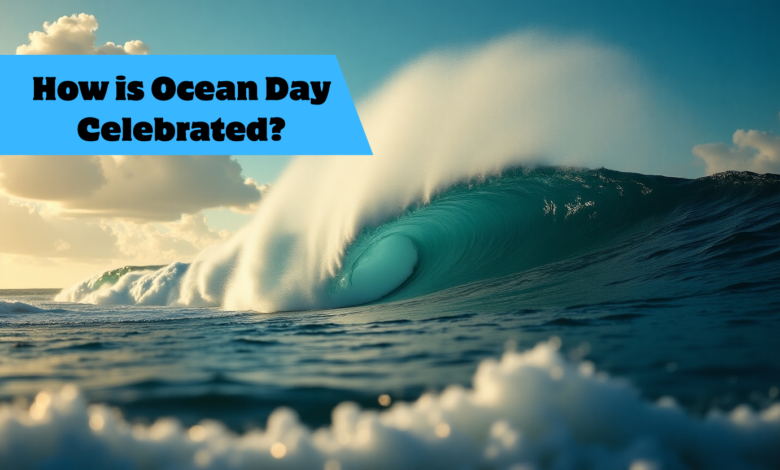
Introduction
Every year on June 8, people around the world come together to honor the ocean’s vital role in our lives through World Ocean Day. While the occasion highlights the pressing need to protect and preserve marine ecosystems, it is also a celebration of the ocean’s beauty, diversity, and importance to the planet. But how is ocean day celebrated across different communities, cultures, and countries?
From large-scale international conferences to small local beach clean-ups, the ways in which World Ocean Day is observed are as vast and diverse as the ocean itself. Governments, non-profits, schools, companies, and individuals take part in a variety of events and activities—both in person and online—to raise awareness, educate others, and inspire action. Exploring how is ocean day celebrated reveals not only the creativity and dedication of those involved but also the collective global effort to ensure the sustainability of our blue planet.
Overview of World Oceans Day
World Oceans Day is an international observance held annually on June 8. The concept was first proposed in 1992 during the Earth Summit in Rio de Janeiro by Canada’s International Centre for Ocean Development and the Ocean Institute of Canada. Although it was celebrated unofficially for several years, the United Nations officially recognized World Oceans Day in 2008, with the first official celebration taking place in 2009. This day serves as a global platform to honor the ocean’s vital role in sustaining life on Earth and to promote collective efforts in its preservation. Understanding how is ocean day celebrated helps highlight the ways individuals and communities can contribute to protecting our marine environment.
Purpose of the Observance
The primary aim of World Oceans Day is to raise awareness about the importance of the ocean and to encourage sustainable practices that protect marine ecosystems. It seeks to inform the public about the impact of human actions on the ocean and to develop a worldwide movement of citizens for the ocean. By engaging individuals, communities, and organizations, the day fosters a sense of responsibility and prompts actions that contribute to the health and sustainability of our oceans. Learning how is ocean day celebrated also inspires more people to join the movement toward a healthier planet.
The Significance of the Ocean

Ecological Importance
The ocean covers over 70% of the Earth’s surface and plays a crucial role in sustaining life. It produces at least 50% of the planet’s oxygen, primarily through marine phytoplankton. Moreover, the ocean is home to a vast array of biodiversity, including countless species of fish, mammals, invertebrates, and microorganisms. This immense biodiversity forms intricate ecosystems that are vital for the health of our planet. Understanding how is ocean day celebrated helps highlight these ecological aspects, emphasizing the need for conservation and sustainable practices.

Economic and Social Value
Beyond its ecological significance, the ocean supports the livelihoods of millions of people worldwide. Industries such as fishing, tourism, and maritime transport rely heavily on healthy marine ecosystems. Coastal communities, in particular, depend on the ocean for food, employment, and cultural identity. Recognizing how is ocean day celebrated brings attention to these economic and social connections, fostering a collective responsibility to protect marine resources for future generations.
Current Challenges
Despite its importance, the ocean faces numerous threats. Overfishing has led to the depletion of fish populations, disrupting food chains and affecting human communities that rely on fishing for sustenance and income. Pollution, including plastic waste and chemical runoff, contaminates marine habitats, endangering wildlife and human health. Climate change exacerbates these issues by increasing sea temperatures and causing ocean acidification, leading to coral reef destruction and loss of biodiversity. By exploring how is ocean day celebrated, we can raise awareness of these challenges and promote actions aimed at mitigating their impact.

United Nations’ Role and Annual Themes
- UN Involvement:
The United Nations plays a pivotal role in orchestrating the global observance of World Oceans Day, celebrated annually on June 8th. This initiative aims to raise awareness about the critical importance of the ocean and mobilize worldwide efforts for its sustainable management. The UN collaborates with decision-makers, indigenous leaders, scientists, private sector executives, civil society, celebrities, and youth activists to highlight ocean-related issues and promote international cooperation. Through events and campaigns, the UN emphasizes the ocean’s role as the lungs of our planet and its significance as a major source of food, medicine, and a vital part of the biosphere.
Global Celebrations and Activities
World Ocean Day unites communities worldwide in celebrating and safeguarding our oceans. This global event fosters a collective commitment to ocean conservation through a diverse array of activities and initiatives.

Educational Events: Workshops, Seminars, and School Programs to Educate the Public About Marine Conservation
World Ocean Day, celebrated annually on June 8th, serves as a pivotal occasion for educational initiatives aimed at fostering marine conservation awareness. Educational events such as workshops, seminars, and school programs play a crucial role in informing the public about the importance of ocean health and the need for its preservation.
For instance, in Mauritius, an initiative called the Sand Watch Project brought together students to engage in activities that enhanced their understanding of marine environments and conservation. Participants collected scientific data and learned about environmental threats such as climate change, erosion, and pollution, deepening their appreciation for oceanic ecosystems.
Additionally, schools and universities around the world host presentations, lectures, and interactive workshops that emphasize the urgency of protecting marine resources. These programs often include films, music, games, and outdoor activities to create a memorable learning experience. When exploring how is ocean day celebrated, these educational efforts stand out as foundational in cultivating a new generation of ocean advocates.
Community Engagement: Beach Clean-Ups, Art Exhibitions, and Sustainable Seafood Festivals Organized by Local Communities and NGOs
Community engagement is a cornerstone of how Ocean Day is celebrated globally. Local communities and non-governmental organizations organize impactful events such as beach clean-ups, public art installations, and sustainable seafood festivals to raise awareness and promote active participation in marine conservation.
Beach clean-ups are one of the most popular activities, bringing together volunteers to collect litter and reduce marine pollution. In India, for example, a series of awareness events focused on environmental sustainability included clean-up drives and educational outreach in coastal areas.
Art exhibitions that focus on ocean-related themes are also common. These creative platforms allow artists to showcase the beauty and fragility of marine life, inspiring others to take part in conservation efforts. Similarly, seafood festivals spotlight sustainable fishing practices, encouraging communities to make eco-conscious dietary choices.
These grassroots initiatives illustrate how is ocean day celebrated at the local level—through inclusive, creative, and action-driven events that connect people directly with the ocean and its protection.
Corporate Initiatives: Companies Hosting Events to Raise Awareness and Funds for Ocean Conservation
Many companies across the globe recognize their role in protecting the environment and use World Ocean Day as a chance to demonstrate their commitment. Corporate initiatives are a significant part of how is ocean day celebrated in the private sector, often involving partnerships with environmental organizations or local communities.
Corporations organize beach clean-ups, employee volunteering programs, educational seminars, and even creative contests to highlight marine conservation issues. These events not only raise awareness but also generate funding for ocean-related causes.
For example, some resort chains celebrate Ocean Day by engaging guests and staff in eco-conscious activities such as beach clean-ups, marine life education, and themed art contests. These events reflect a dedication to sustainability and help promote a message of collective responsibility.
Corporate initiatives are instrumental in amplifying the reach and impact of World Ocean Day, making it a truly global event supported by individuals, communities, and businesses alike. They offer a powerful example of how is ocean day celebrated across different sectors to support a shared goal—protecting the health of our oceans.
Virtual and Digital Participation
World Ocean Day, celebrated annually on June 8, has increasingly embraced virtual and digital platforms to engage a global audience in ocean conservation efforts. These online initiatives offer accessible opportunities for individuals and communities worldwide to participate in educational and interactive activities, fostering a collective commitment to preserving our oceans.

Online Campaigns: Social Media Challenges Like “Wear Blue, Tell Two,” Encouraging Individuals to Wear Blue and Share Two Facts About the Ocean
World Ocean Day, celebrated annually on June 8, has increasingly embraced virtual platforms to engage a global audience. Online campaigns, especially through social media, have become powerful tools for raising awareness and encouraging personal involvement in ocean conservation.
One notable example is the “Wear Blue, Tell Two” challenge. This campaign invites individuals to wear blue in solidarity with ocean protection and share two facts about the ocean on their social media platforms. This simple yet impactful initiative spreads awareness across diverse audiences and empowers individuals to become ocean advocates in their own communities.
As part of how is ocean day celebrated, these social media movements play a vital role in generating global momentum. Hashtags, videos, and infographics are widely shared to promote educational messages, highlight conservation success stories, and inspire positive action.
In addition to challenges, organizations run online contests, quizzes, and digital pledge drives, making it easier than ever for people to take part in World Ocean Day regardless of location or resources.
Virtual Events: Live-Streamed Conferences, Webinars, and Digital Art Exhibitions to Engage a Global Audience
Virtual events have become an essential feature of how is ocean day celebrated, especially in recent years where digital access has made global outreach more inclusive. Live-streamed conferences and webinars hosted by environmental organizations, universities, and global institutions provide educational opportunities for individuals to learn directly from marine scientists, activists, and policymakers.
For example, ocean literacy summits held online bring together stakeholders from around the world to discuss sustainable practices, the importance of marine biodiversity, and actions needed to combat climate-related ocean threats. These sessions often include Q&A segments, allowing participants to engage in meaningful dialogue.
Digital art exhibitions have also emerged as a creative and engaging component of virtual celebrations. Artists from various backgrounds showcase ocean-themed works—photography, painting, animation, and more—to evoke emotional connections and highlight marine beauty and fragility.
Through these virtual and digital avenues, how is ocean day celebrated has evolved beyond in-person events to embrace a truly global and interactive format. These efforts ensure that ocean advocacy reaches a wider audience, encouraging a worldwide community to take collective action for the oceans’ future.
Regional Observances
Japan’s Marine Day: Known as “Umi no Hi,” Celebrated on the Third Monday of July to Express Gratitude for the Ocean’s Bounty
In Japan, Marine Day—called “Umi no Hi”—is a national holiday observed on the third Monday of July. It was officially established in 1996 to honor the ocean’s critical role in the country’s history, economy, and culture. The day also commemorates Emperor Meiji’s historic 1876 voyage by sea, symbolizing Japan’s maritime strength and connection to the ocean. As part of how is ocean day celebrated in Japan, families and communities take part in a range of cultural and recreational activities:
- Beach Visits: Families often head to coastal destinations to enjoy swimming, snorkeling, and water sports. Popular beaches like Shirahama and those in Okinawa become hubs of celebration.
- Fireworks Displays: Evening fireworks festivals—known locally as “hanabi taikai”—are a beloved tradition. These events are often held near the sea and attract large crowds with vibrant displays lighting up the night sky.
- Maritime Events: Cities and towns organize boat races, yacht parades, and fishing competitions to showcase maritime heritage and promote awareness of marine conservation.
- Aquarium Visits: Aquariums across Japan hold special exhibits and marine-themed educational programs for children and families, fostering a deeper appreciation of marine life.
- Seafood Cuisine: Many restaurants serve seasonal seafood dishes, encouraging people to reflect on the ocean’s bounty and the importance of sustainable fishing.
Japan’s Marine Day is a vivid example of how is ocean day celebrated regionally, blending cultural pride with environmental consciousness.
Coral Triangle Day: Observed on June 9 in Countries Like Indonesia and the Philippines, Focusing on the Conservation of the Coral Triangle Region
Coral Triangle Day is observed annually on June 9 in countries such as Indonesia, the Philippines, Malaysia, Timor-Leste, Papua New Guinea, and the Solomon Islands. This day highlights the ecological significance of the Coral Triangle, a region known for its extraordinary marine biodiversity and vital role in global ocean health.
This regional observance has become a key example of how is ocean day celebrated in Southeast Asia, focusing strongly on conservation and community engagement. Key activities include:
- Beach Clean-Ups: Community-led efforts help reduce pollution and raise awareness about the threats facing coral reefs, such as plastic waste and overfishing.
- Sustainable Seafood Campaigns: Events promote the use of sustainably harvested seafood, encouraging consumers to make environmentally responsible food choices that help protect marine ecosystems.
- Educational Workshops and Exhibitions: Schools, NGOs, and government agencies host public seminars and interactive exhibitions to educate people about coral reefs, climate change, and marine protection.
- Cultural Festivals: The day is often marked with local music, dance, art, and food festivals that celebrate both the ocean and the diverse cultures of the Coral Triangle region.
Coral Triangle Day is a powerful demonstration of how is ocean day celebrated through community involvement, education, and cultural pride—reminding us of the vital need to preserve some of the richest marine environments on Earth.
How Individuals Can Participate in World Ocean Day?
World Ocean Day, celebrated annually on June 8, offers individuals a meaningful opportunity to contribute to ocean conservation through personal actions and educational engagement. Understanding how is ocean day celebrated can inspire proactive steps toward preserving marine environments.
Personal Actions: Reducing Plastic Use, Supporting Sustainable Seafood Choices, and Participating in Local Conservation Efforts
- Reducing Plastic Use: Plastic pollution poses a significant threat to marine life. Individuals can minimize their impact by avoiding single-use plastics such as bags, bottles, and utensils. Opting for reusable alternatives helps prevent plastic waste from entering the ocean.
- Supporting Sustainable Seafood Choices: Overfishing and unsustainable fishing practices endanger marine ecosystems. Choosing seafood products that are sustainably sourced ensures that marine resources are harvested responsibly, supporting the long-term health of ocean life.
- Participating in Local Conservation Efforts: Taking part in beach clean-ups, habitat restoration projects, or volunteering with environmental organizations fosters community involvement and directly benefits marine environments. These efforts not only improve local ecosystems but also raise awareness about ocean protection.
These everyday actions demonstrate how is ocean day celebrated on an individual level—through responsible choices and active participation in conservation efforts.
Educational Engagement: Learning About Marine Ecosystems and Sharing Knowledge Within Communities
- Educating Oneself About Marine Ecosystems: Understanding topics such as oceanography, marine biology, and climate impacts helps individuals make informed decisions and advocate for change. Learning about these subjects can empower people to become ocean ambassadors in their daily lives.
- Sharing Knowledge Within Communities: Organizing small events like talks, movie nights, or school workshops can spread awareness and encourage others to join the cause. By discussing ocean issues in local communities, individuals can spark collective action and inspire sustainable habits.

Conclusion
Understanding how is ocean day celebrated worldwide highlights the collective responsibility we share in preserving our oceans. World Ocean Day serves as a powerful reminder of the need for global cooperation to safeguard marine environments for future generations. The ocean, covering over 70% of our planet’s surface, is vital to our survival, providing oxygen, regulating climate, and sustaining biodiversity. However, it faces significant threats from pollution, overfishing, and climate change.
International agreements, such as the High Seas Treaty, exemplify efforts to protect marine biodiversity beyond national jurisdictions. Yet, the success of such treaties depends on widespread ratification and implementation. As of now, only a fraction of countries have officially adopted the treaty, leaving vast ocean areas vulnerable. This highlights the need for continued advocacy and collaboration among nations.
Collective action involves governments, industries, communities, and individuals working together to address oceanic challenges. Initiatives like the Decade of Ocean Science for Sustainable Development (2021–2030) aim to enhance scientific research and promote sustainable practices. Such collaborative efforts are crucial in developing innovative solutions to protect our oceans.
On World Ocean Day, communities across the globe participate in activities such as beach clean-ups, educational workshops, and policy discussions, showing the power of unified action. These events not only raise awareness but also foster a shared sense of responsibility. The theme “One Ocean, One Climate, One Future – Together!” captures the essence of these efforts, reminding us that the ocean’s health is inseparably linked to our collective future.
In essence, ensuring the sustainability of our oceans is a shared duty that transcends borders. Through cooperation, education, and action, we can protect and restore our oceans—securing a thriving and healthy planet for generations to come.





